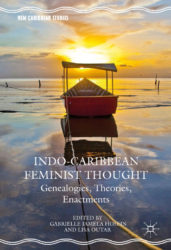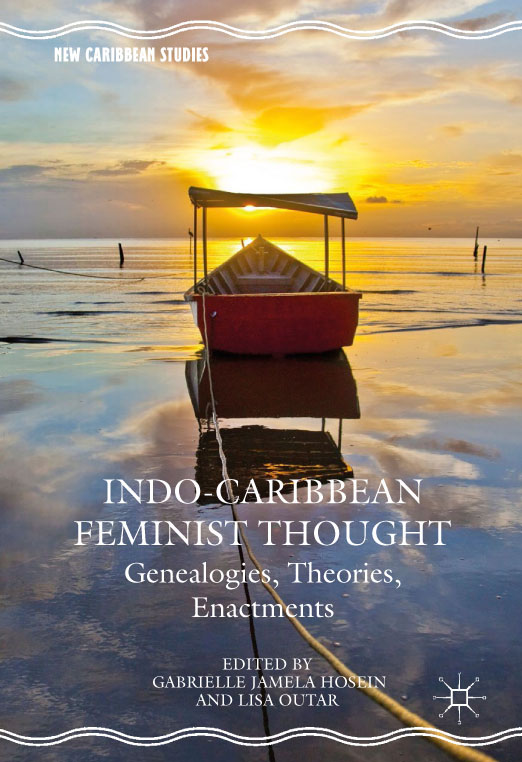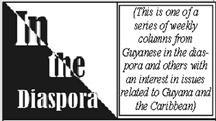Dr. Lisa Outar is an independent scholar who researches Anglophone and Francophone Caribbean literature. Originally from Port Mourant, Guyana, she publishes in the areas of Indo-Caribbean literature, feminist writing and the connections between the Caribbean and other sites of the indentureship diaspora. She serves as an editor of the Journal of West Indian Literature.
This year marks the hundredth anniversary of the end of indentureship. It is an appropriate time for reflection on the traumas and legacies of that system and on the complex societies that have been left in its wake and in the wake of slavery and colonialism. What traditions of strength and resilience do we see unfurling from that past to now? What toxic patterns of violence and class, race and gender relations persist? What are ways in which we, who live in the modern Caribbean and its diasporas, negotiate those inheritances that often unconsciously shape our mindsets and our sense of what is possible?
 Engaged in this process of reflection, I am pleased to be returning home to Guyana this week to launch Indo-Caribbean Feminist Thought: Genealogies, Thoughts, Enactments, an anthology that I edited with Dr. Gabrielle Hosein, Head of the Institute of Gender and Development Studies at the University of the West Indies, St. Augustine Campus, Trinidad. It is a book collection that meditates on the questions posed above and on what both older and newer expressions of Indo-Caribbean feminist thinking look like. We brought together three generations of writers, scholars, activists, artists (some of the contributors are women and men who embody all of those roles at the same time) in order to assess a genealogy of feminist thought and enactments among Indo-Caribbean-descended men and women. Some of the contributors to the book such as Dr. Patricia Mohammed and Dr. Rhoda Reddock have been for decades at the forefront of researching the unique circumstances for Indo-Caribbean women while working within the broader projects of Caribbean feminism. This collection is not an attempt to stand outside of that latter tradition, but rather a sustained effort to trace the unique contributions that Indo-Caribbean and dougla women have made to feminist thinking in the region as well as the many forms that those interventions take.
Engaged in this process of reflection, I am pleased to be returning home to Guyana this week to launch Indo-Caribbean Feminist Thought: Genealogies, Thoughts, Enactments, an anthology that I edited with Dr. Gabrielle Hosein, Head of the Institute of Gender and Development Studies at the University of the West Indies, St. Augustine Campus, Trinidad. It is a book collection that meditates on the questions posed above and on what both older and newer expressions of Indo-Caribbean feminist thinking look like. We brought together three generations of writers, scholars, activists, artists (some of the contributors are women and men who embody all of those roles at the same time) in order to assess a genealogy of feminist thought and enactments among Indo-Caribbean-descended men and women. Some of the contributors to the book such as Dr. Patricia Mohammed and Dr. Rhoda Reddock have been for decades at the forefront of researching the unique circumstances for Indo-Caribbean women while working within the broader projects of Caribbean feminism. This collection is not an attempt to stand outside of that latter tradition, but rather a sustained effort to trace the unique contributions that Indo-Caribbean and dougla women have made to feminist thinking in the region as well as the many forms that those interventions take.
We are well aware that feminism is a loaded term for many, but we also know that it is an important struggle that both men and women have engaged in to achieve better gender relations and better lived conditions for themselves and their children. Some of the efforts that are tracked in the book are not necessarily by people who use that term to define their interventions, but nevertheless are part of a history that we can trace for how space has been cleared for Indian women to move outside of stereotypes about who they are and what they can achieve in the realms of education, literature, scholarship, the arts and the public sphere.
We have an inclusive understanding of this trajectory we are calling Indo-Caribbean feminist thought. We have a whole section on dougla feminism because our understanding of Indianness is not as something that is essentialist and exclusionary. Indianness became part of the inheritance of all in the Caribbean from the moment those first arrivals touched these shores. It is particularly important that we pay attention to the ways in which mixed-race women, girls and men are taking up categories of belonging, agency, empowerment and citizenship. Dougla women and girls especially are placed on the battlegrounds of our long and hard-held understandings of race and cultural belonging and so in fact are often the ones thinking hardest about the legacies to be negotiated in their day-to-day lives and in others’ and their own conceptions of themselves. The relevance of these categories stretches far beyond the region as Sue Ann Barratt’s chapter on Nicki Minaj makes clear.
Indo-Caribbean masculinities is also an important part of our thinking about gender relations in the region and beyond. In my chapter in the book, I trace, in addition to other things, the contributions that some Indian men have made to supporting the public sphere activities of Indo-Caribbean women from moments far earlier than what we typically think of now. While Caribbean masculinities is now an established field of study, much less work has been done on how Indo-Caribbean men negotiate constructions of gender and cultural expectations of manhood shaped by all sorts of influences, including systems set in place by the plantation. We are glad to be able to include such interrogations in the collection and hope it can set the tone for some of the essential collective conversations we must be having to respond to the urgent and persistent issues of intimate partner violence, sexual abuse, alcoholism, suicide and depression in our communities.
We are especially proud of the collaborative work that this book represents; working both from within the region and in the diaspora, we understand that one perspective without the other makes it impossible to understand the full unfurling of histories of Indo-Caribbean cultural production and community development. It is also important to remember that indentureship was a system that affected more than just the Caribbean and that its implementation and aftermath ties us to Mauritius, Fiji, South Africa, Reunion and elsewhere. This book project was thus also intended to push our ways of thinking about the ties and solidarities that we share with other parts of the global south and to ignite new avenues for explorations in post-indentureship feminist thought.
Our investigations and theorizing unapologetically track traditions of Indo-Caribbean women’s resilience, inventiveness and agency but are also positioned as a legacy that belongs to all Caribbean peoples regardless of race, class or gender. It is not ethnic separatism to look at the ways in which Indo-Caribbean-descended women and some men navigate their specific gendered, classed, cultural identities, but rather a widening of the terrain from which we can all draw to understand better the complex conditions of our lives post-slavery, indentureship and colonialism and in newer frameworks of neocolonialism and diaspora.
We wanted to launch this collection in Guyana and Trinidad first because these are the spaces which shape us as scholars and as women and with which our scholarship and activism are deeply engaged. The launch events, hosted graciously by the University of Guyana and by UG’s new Institute of Gender Studies, and in partnership with the Women & Gender Equality Commission (WGEC), will be on May 11th at 5pm on the Turkeyen campus and on May 12th at 3pm on the Tain campus. We hope to see you there.


